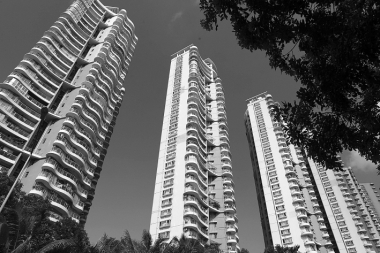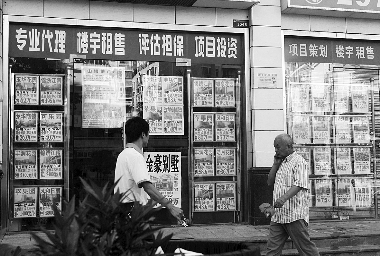  Han Ximin TRANSACTIONS of pre-owned apartments have increased greatly since the government announced it would use valuation prices instead of contract prices to collect taxes on pre-owned homes. The new rule became effective yesterday. Statistics from the housing property registration center showed there was an average of about 500 applications per day in June, but since July 1, applications have doubled to more than 1,000 a day. Statistics from the city’s planning and land resources authorities showed that between June 10-30, a total of 8,466 flats were sold, or 564 flats a day. During the same period last year, just 4,828 transactions were signed, 344 apartments a day. In the 21 days before the announcement of the new rule, the city saw 5,868 transactions of pre-owned apartments, or 419 a day. Transactions of pre-owned apartments accounted for 70 percent of total apartment transactions in Shenzhen. In June a total of 12,152 apartments were sold and 9,094 apartments were pre-owned. The local taxation authority said levying taxes according to valuation prices instead of contractual prices was to control housing speculation and tighten taxation control over speculative transactions, “The new rule is aimed at solving the ‘yin-yang contracts’ practice, whereby sellers and buyers sign both a ‘public’ and a ‘private’ contract on the same second-hand property to evade taxes on gains from the sale,” Yang Long, deputy chief of Shenzhen Municipal Local Taxation Bureau, said in an earlier interview. The “private” contract was signed under the table and kept by both buyer and seller. They then submited a fake document that stated a much lower transaction value to the land bureau, Yang said. It is unknown whether the valuation by the government reflects market value, which is determined by location, structure, records and construction costs. But some insiders say the valuation is about 70 percent of the market price, if the sellers and buyers register housing transactions below the valuation price, the system will levy taxes at the valuation price, which include a business tax, personal income tax for sellers and a transaction tax for buyers. The system will give reference prices of 1.54 million pre-owned apartments. Experts say the pre-owned apartment transactions would be greatly reduced after the new rule took effect. Voices Up or down? “The new rule will give a clear picture of home transactions and plug taxation loopholes by preventing vendors from signing a contract with a price much lower than the market price to evade taxes, so it will not cause prices in the secondary housing market to rise.” —Yang Long, vice chief of Shenzhen Municipal Local Taxation Bureau “Transaction costs on sales of flats are sure to rise under the new rule, so the housing prices will also be pushed up by the taxes because sellers will shift the cost caused by taxes to buyers to ensure they gain, so in the short term, prices will go up.” — Song Ding, director of Tourism and Housing Market Research Institute under the China Development Institute. “The increasing transaction cost will force potential buyers to hesitate, and thereby cause a drop in housing transactions, so in the short term, the volume of transactions will be reduced but the price will increase. If the transactions continue a downturn, prices for pre-owned apartments will drop.” — Han Shitong, research fellow of Economic Management Research Center of Beijing University Who should bear more? Han Ximin AN online survey showed that 70 percent of netizens estimate that buyers will bear the cost under the new rule that imposes taxes according to the property’s value. Another 18 percent estimates that both sellers and buyers should share the cost. According to the rule, the seller should pay a business tax and a personal income tax while the buyer should bear the title deed tax. It is illegal for sellers to ask buyers to bear the business tax and personal income tax, the local taxation authority said. But in reality, the sellers only care about their gains, and eventually the buyers bear all the cost. According to Xiao Xiaoping, manager of the Marketing Research Institute of Shihua Real Estate Co. Ltd. the transaction mode will be hard to change even after the new rule is implemented. “It will also be possible for sellers to compromise by slightly reducing prices, but it is unlikely to happen because in 2008, even when the market was low, few sellers chose to share the taxes,” Xiao said. According to the new regulation, sellers have the option of paying income tax at a 20 percent rate of gain, or by rates of 1 percent, or 1.5 percent of the taxable value, depending on whether the property was above or below 144 square meters. The vendor would not need to pay income tax if the apartment was his sole property and it had been owned for more than five years. The buyer should pay the title deed tax at a rate of 1 percent for ordinary housing or 1.5 percent for the up-market flats based on the taxable value. Take a real case for example where a man buys an apartment for 1 million yuan (US$154,560) in 1997 and intends to sell it for 3 million yuan. Previously, he needed to pay a business tax of 56,000 yuan (5.6 percent of 1 million yuan). The buyer should pay a title deed tax of 15,000 yuan (1.5 percent of 1 million yuan). Under the new rule, the seller should pay a business tax of 168,000 yuan ( 5.6 percent of 3 million yuan) and an income tax of 30,000 yuan (1 percent of 3 million yuan). The buyer should pay a title deed tax of 45,000 yuan (1.5 percent of 3 million yuan). | 
